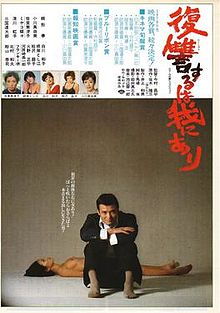 This much acclaimed, multi award-winning Japanese drama from 1979 can be viewed as the HENRY: PORTRAIT OF A SERIAL KILLER of the seventies. It’s also, in my eyes at least, one of the most overrated films of all time. Not that it isn’t effective in spots, but it’s also incredibly labored, unfocused and long-winded.
This much acclaimed, multi award-winning Japanese drama from 1979 can be viewed as the HENRY: PORTRAIT OF A SERIAL KILLER of the seventies. It’s also, in my eyes at least, one of the most overrated films of all time. Not that it isn’t effective in spots, but it’s also incredibly labored, unfocused and long-winded.
According to many pundits, the veteran filmmaker Shohei Imamura is “the leading figure of post-war Japanese cinema.” In direct contrast to mainstream Japanese filmmakers like Akira Kurosawa (Imamura’s foremost rival), Imamura was often drawn to sordid subject matter in films like THE INSECT WOMAN (NIPPON KONCHUKI; 1963), THE PORNOGRAPHERS (JINRUIGAKU NYUMON; 1966) and THE EEL (UNAGI; 1997). VENGEANCE IS MINE (FUKUSHU SURU WA WARE NI ARI; 1979) is widely considered one of Imamura’s most “shocking” works. It was his premiere feature after a lengthy sojourn making documentaries and is widely considered one of his finest works—indeed, many critics have voted it the finest Japanese film of the 1970’s.
Obviously I disagree with that sentiment. For that matter, I find Imamura’s films in general to be hopelessly overrated. Certainly he deserves credit for his radical (by mainstream Japanese standards, at least) choice of subjects, but all the Imamura films I’ve seen tend to be pretentious and melodramatic, the present one included. However, as outlined above, just about everyone else appears to disagree. Am I missing something?
Iwao Enokizu is a (seemingly) emotionless serial killer who is apprehended by authorities amidst a storm of public scrutiny. Enokizu is interrogated by police inspectors, who find themselves unnerved at how matter of factly he recounts his crimes. They also track down his father and former lady friends, who fill in the gaps of his reminiscence.
It seems that Enokizu was a problem child from the start, and graduated to petty crime when he became a young man. After a stint in jail, he was shocked to arrive home and find his wife, the product of an arranged marriage, engaged in a relationship with his father. Enokizu then embarked upon a 78-day spree of murder (most of which occurs off-screen) and crime. He eventually shacked up with a naïve young woman and her elderly mother—needless to add, neither lasted long. He was eventually turned in on his way to a pawn shop to sell his deceased girlfriend’s goods.
Back in the present Enokizu is sent to the gallows while his father and ex-wife attempt to reconcile themselves to the realities of his crimes. They toss his bones off the top of a mountain, but the apprehension remains.
What distinguishes this film from other serial killer flicks is its steadfast refusal to condemn or even fully explain the murderous behavior of its protagonist. Then again, anyone who’s seen HENRY: PORTRAIT OF A SERIAL KILLER or any of its innumerable imitations won’t be too surprised; that film, after all, did everything this one does in far less than the 142 snail-paced minutes it takes Imamura. VENGEANCE IS MINE, in short, hasn’t dated well at all.
Of course, Imamura had extremely lofty aims, as evinced by his statement “I think I can see the forlorn inner soul of today’s man.” He imparts quite a few none-too-subtle points about modern Japan herein, which makes for a rambling narrative that often loses sight of its subject (superbly played, I might add, by Ken Ogata, the star of Paul Schrader’s MISHIMA). Imamura’s dense and complex visual compositions are often impressive, but they tend to draw attention away from the narrative, which is cluttered enough as it is. I’ll have to give this film credit for being one of the first to examine, in unflinching, non-moralistic fashion, the exploits of a serial killer…but the fact is Henry could kick this guy’s ass any day of the week.
Vital Statistics
VENGEANCE IS MINE (FUKUSHU SURU WA WARE NI ARI)
Shochiku Company Ltd.
Director: Shohei Imamura
Producer: Inoue Kazuo
Screenplay: Baba Maseru
(Based on a novel by Saki Ryuzo)
Cinematography: Himeda Shinsaku
Editing: Uraoka Keiichi
Cast: Ken Ogata, Mikuni Rentaro, Baisho Mitsuko, Ogawa Mayumi
